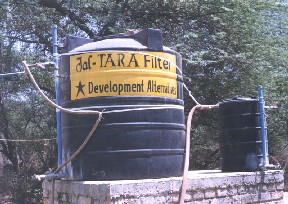|
CLEAN-Jhansi
in Action
Manuja Shukla & Anand Rai
cleanjhansi@yahoo.co.in
Natural Colours
Holi, a festival of colours, has turned into a festival of chemicals.
We have been using toxic colours, which are not only harmful for human
skin, but also for our environment. CLEAN-Jhansi students created
awareness among their friends and community for an Eco-Friendly Holi,
utilizing Natural colours. Students enthusiastically pasted
posters, distributed pamphlets in schools, colonies and markets,
depicting the harmful effects of synthetic colours and the benefits of
using natural colours. The natural colours provided to the community
were prepared by women self help groups of Niwari block, Tikamgarh
(‘Become environment friendly – Create more jobs’). Several
outlets were set up for easy availability of these colours. It was
encouraging for the students when media, both print and visual, joined
their efforts to create mass awareness. The impact was clearly
visible when customers started demanding organic colours instead of
synthetic ones.
CLEAN-India
addresses peri-urban problems
 Few
schools at Niwari Block, Tikamgarh district have shown a keen interest
in participating in various activities of the CLEAN-India Few
schools at Niwari Block, Tikamgarh district have shown a keen interest
in participating in various activities of the CLEAN-India programme. Initially, to create awareness among people and making
them realise their responsibilities, an inter-school competition on “Niwari
Ka Paryavaran Aur Hum” was conducted. CLEAN-India student
members then surveyed all wards of Niwari and on interaction with
housewives, concluded that there was no systematic procedure for
collection and disposal of garbage. Wards generating 90% biodegradable
waste were willing to segregate their waste and also pay for its
collection. It was decided that a decentralised organic waste
management system would be set up. This system will be unique and
distinctly different from other conventional ways, as it would provide
livelihoods for weaker sections and also help in maintaining a hygienic
environment.
programme. Initially, to create awareness among people and making
them realise their responsibilities, an inter-school competition on “Niwari
Ka Paryavaran Aur Hum” was conducted. CLEAN-India student
members then surveyed all wards of Niwari and on interaction with
housewives, concluded that there was no systematic procedure for
collection and disposal of garbage. Wards generating 90% biodegradable
waste were willing to segregate their waste and also pay for its
collection. It was decided that a decentralised organic waste
management system would be set up. This system will be unique and
distinctly different from other conventional ways, as it would provide
livelihoods for weaker sections and also help in maintaining a hygienic
environment.
CLEAN-Jhansi makes New Friends
 Activities
of CLEAN-Jhansi are visibly making impacts and we have new friends who
have joined hands in various activities of the Activities
of CLEAN-Jhansi are visibly making impacts and we have new friends who
have joined hands in various activities of the programme. Saraswati Shishu Mandir, which is located in a slum, has
provided the space and shelter for discussion with slum people. During
their regular rounds of seasonal water monitoring in the slum, water
logging was found to be a major problem around the drinking water
source. Construction of soak pit was found to be the probable
solution. Discussion with the residents
regarding
the benefits of a soak pit resulted in ample contribution from their
side in terms of labour
and money.
The construction of soak pit has not only solved the water availability
problem but also resulted in cleaner surroundings. During
monsoons,
tree plantation was carried out and trees of medicinal value and native
species of the Bundelkhand region were planted. The saplings were
protected with pieces of bricks, bamboo, or with an old saree or
dhoti. Slum children have actively participated in tree plantation
and are also nurturing them with keen interest.
programme. Saraswati Shishu Mandir, which is located in a slum, has
provided the space and shelter for discussion with slum people. During
their regular rounds of seasonal water monitoring in the slum, water
logging was found to be a major problem around the drinking water
source. Construction of soak pit was found to be the probable
solution. Discussion with the residents
regarding
the benefits of a soak pit resulted in ample contribution from their
side in terms of labour
and money.
The construction of soak pit has not only solved the water availability
problem but also resulted in cleaner surroundings. During
monsoons,
tree plantation was carried out and trees of medicinal value and native
species of the Bundelkhand region were planted. The saplings were
protected with pieces of bricks, bamboo, or with an old saree or
dhoti. Slum children have actively participated in tree plantation
and are also nurturing them with keen interest.
No Polybags for us Please
In order to reduce the use of polybagss in our community, students of
St. Francis School made paper bags and envelops in their school
utilizing old newspaper. These bags were distributed in the market
to shopkeepers and also spread the message on the ill effects of
plastics. It was encouraging to see shopkeepers using these paper
bags and demanding for more.
Water
Quality Problems
Continuous and regular monitoring of water source and relevant
discussions with staff of our member school, Christ the
King
College, revealed that drinking water in the school campus had
bacteriological contamination and high turbidity problems during
monsoons. Hence, Jal-TARA filter was installed in the school, which is a
perfect filter that helps in water purification without any chemical
treatment or electricity and needs minimum maintenance.
CLEAN-Jhansi is on its way to achieving the final aim of creating CLEAN
communities. Some progress has been made in changing the attitudes
and mind sets of people – yet, a long way to go.
Back to Contents |